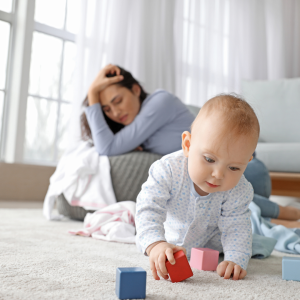“Baby Blues” vs. Postpartum Depression

Having a baby brings excitement and intense change. Nearly 80 percent of new moms experience some type of “baby blues,” while up to 15 percent experience postpartum depression. Another 10 percent deal with postpartum anxiety. Combine sleep deprivation with the 24/7 demands of a newborn, and it is no wonder many moms wrestle with feelings of irritability and moodiness.
Symptoms
- Weepiness or crying for no apparent reason
- Impatience
- Irritability
- Restlessness
- Anxiety
- Fatigue
- Sadness
- Mood changes
Length of time is key indicator
Baby blues usually last less than two weeks, and symptoms diminish on their own. Postpartum depression can begin within days of giving birth, but for others, it may not arise until their spouse or other support system returns to work, breastfeeding stops or becomes a struggle and sex and/or birth control resumes.
Gone untreated, postpartum depression can last for months or years after birth. This can also greatly interfere with a mother’s ability to bond with the baby, which can slow down the baby’s normal development.
Ditch social media perfection
Tisha Bayless, LCPC, with Memorial Behavioral Health, believes moms need to find a safe place to be transparent about their struggles in early motherhood.
“It’s hard for many women to admit that motherhood isn’t always what they’d imagined it to be, that it’s difficult, it frequently comes with a lot of anxiety, and it can make us feel very isolated,” she said. “Being able to talk frankly with other women about motherhood can be very rewarding and normalize a lot of feelings and experiences for new moms.”
If you or someone you know is struggling with postpartum depression, schedule an appointment to speak with a provider. Our locations and contact information can be found here.
Related Articles
4 Tips for Coping With New-Mom Anxiety
Bringing Home Baby: Keeping Your Mental Health a Priority
Bringing Home Baby: Now That You’re No Longer Expecting